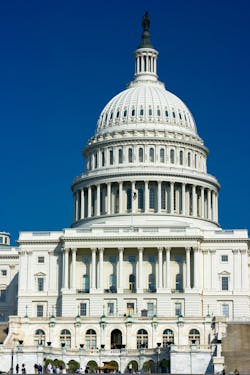AMGA Asks Congressional Leaders to Strengthen Aid to Medical Groups and Other Providers
Leaders of the American Medical Group Association (AMGA), the Alexandria, Va.-based national association representing many of the nation’s larger medical group practices, on Sep. 15 wrote a letter to the top leaders in both major parties in the United States Senate and House of Representatives, imploring them to pass legislation to continue to fund the Public Health and Social Services Emergency Fund (Provider Relief Fund), and to work with the U.S. Department of Health and Human Services to help oversee distribution from the Fund.
The letter, which went under the signature of AMGA president and CEO Jerry Penso, M.D., was addressed to four leaders: House Speaker Nancy Pelosi, Senate Majority leader Mitch McConnell, Senate Majority Leader Mitch McConnell, House Minority Leader Kevin McCarthy, and Senate Minority leader Chuck Schumer.
Dr. Penso began the letter thus: “Dear Speaker Pelosi, Majority Leader McConnell, Minority Leader Schumer, and Minority Leader McCarthy: On behalf of AMGA, I would like to thank you for assisting our members and other healthcare providers as we battle the novel coronavirus (COVID-19) pandemic. Founded in 1950, AMGA represents more than 440 multispecialty medical groups and integrated delivery systems, representing about 175,000 physicians who care for one in three Americans. Our physicians, medical groups, and integrated systems have been on the front lines of this public health emergency from the beginning and have navigated the new normal to continue providing high-quality, cost-effective, patient-centered medical care. AMGA members have expanded telehealth services, worked with state and local health authorities to create testing centers, repurposed staff to expand patient access, and slowly reopened offices with enhanced safety protocols to remain a reliable mainstay in the communities they serve. Yet, despite these efforts, there is still a need for additional funding to ensure that our providers can treat patients in these uncertain times, especially as they prepare for the upcoming flu season. The overlap of COVID-19 and influenza could devastate our nation’s healthcare system, which has already been profoundly impacted by the pandemic. AMGA members indicate that the combination of these viruses will likely stretch hospital and provider capacity at least through the spring of 2021. Therefore, we urge Congress to act swiftly to approve a much needed additional COVID-19 relief package so that medical groups and integrated delivery systems can continue to operate in their communities and care for their patients,” he wrote.
Among the actions that Dr. Penso asked congressional leaders to take, on behalf of physician groups and other patient care organizations nationwide, include the following:
> [C]ontinue funding the Public Health and Social Services Emergency Fund (Provider Relief Fund) in future legislative packages and to work with the U.S. Department of Health and Human Services to continue to exercise oversight over the distribution of these funds. Additionally, we ask that Congress approve the Eliminating the Provider Relief Fund Tax Penalties Act (H.R.7819/S. 4525), which would ensure that any funding received by for-profit entities under the Provider Relief Fund would not be taxable.
> The Medicare Accelerated and Advance Payment (AAP) Program has extended more than $100 billion in loans to providers. While this program has been an important option for providers during this health crisis, more reasonable repayment terms and interest rates are necessary. Although there have been many requests to postpone loan recoupment, the Centers for Medicare & Medicaid Services (CMS) may start making providers repay their AAP loans, adding further stress. In addition to these requirements, which are already difficult to meet, CMS on April 26 abruptly and without any previous notice announced its intentions to suspend and reevaluate the AAP Program. We support efforts in Congress that would reinstate the AAP Program, as well as those that would extend more reasonable interest rates and repayment terms for the loans.
> Previously, Congress enacted legislation to waive Medicare’s geographic limitations during this national emergency through H.R. 6074, the Coronavirus Preparedness and Response Supplemental Appropriations Act, 2020. Additionally, CMS expanded the number of services that can be utilized under telehealth…. We ask that Congress approve the Temporary Reciprocity to Ensure Access to Treatment (TREAT) Act (S. 4421), which would provide state reciprocity in licensing of healthcare professionals to enable them to practice across state lines during the COVID-19 pandemic. AMGA also urges Congress to work with CMS to make permanent a recent agency decision to allow diagnoses made over telehealth encounters to count toward risk adjustment for Medicare Advantage, Accountable Care Organizations, and other Medicare risk-adjusted programs. Throughout the COVID-19 pandemic, providers have seen the value in delivering services remotely to reach populations they otherwise may not have been able to treat.
> The Coronavirus Aid, Relief, and Economic Security (CARES) Act created the Employee Retention Tax Credit (ERTC), which provides payroll relief to employers financially impacted by COVID-19. The Health and Economic Recovery Omnibus Emergency Solutions (HEROES) Act aimed for an even bigger economic impact by making several improvements to the CARES Act, such as increasing the credit to cover 80 percent of up to $45,000 in qualified wages this year (up from 50 percent of $10,000). The proposal clarifies that “qualified wages” include qualified health benefits and that employers who continue providing such benefits to their employees qualify for the ERTC, even if they do not continue paying other qualifying wages. The size limit for large employers was also increased, from originally having more than 100 employees to having more than 1,500 employees, which grants more employers significant tax relief. We hope that Congress includes these tax reforms in an upcoming COVID-19 relief package so that more employees can keep their jobs.


